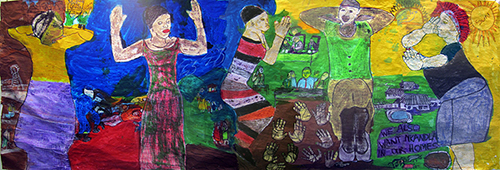Latest News Archive
Please select Category, Year, and then Month to display items
09 December 2020
|
Story UFS entral academic advising team
|
Photo Pixabay

It wasn’t easy, but we all got to this point because we stayed calm and made the effort to learn on even when it was difficult.
The University of the Free State (UFS) has remained committed to supporting you in every way possible, and as you prepare for the final assessments, remember to access the support tools you will need in order to successfully complete the 2020 academic year: https://www.ufs.ac.za/toolsforsuccess
Main exams are running from 30 November to 19 December 2020
All of the best, and break a pen in your upcoming final assessments. For those of you who will be graduating, we cannot wait to see you in that graduation attire; and those who still have some way to go, we cannot wait to serve you again in 2021 as we continue the pursuit of academic success!
Below are five main study tips that you can use for final assessment success:
1. Set a realistic study schedule
You might think that studying for eight hours straight for four days before the exam, will help you get through the work in time. See final edition of the #UFSLearnOn for more information.
2. Structure and organise your work
If your notes are organised, it is also easier for your brain to recall information, even when you become nervous during exams.
3. Practise with an old exam/semester test paper
Practice makes perfect, and although the final assessments might look different in how they are administered, it will still help to practise using old tests and exams.
4. Adapt your strategies to the content
What works for one module or even one learning outcome, might not be effective for another. You need to continually adapt your note-taking and study approaches. See #UFSLearnOn final edition for different study methods.
5. Healthy body, healthy mind
Your brain needs optimal care to perform at its best, and getting physically active (even if it is by jumping in one spot if space is limited) forces your body to release neurotransmitters responsible for positive emotions, which assist in retaining information in your memory …
Download the final edition of #UFSLearnOn that points you towards the resources you’ll need to ace your final assessments and end 2020 off on a high note!
Panel to discuss: 'Speaking wounds: voices of Marikana widows through art and narrative' on Monday 27 July 2015
2015-07-24
The massacre of 34 mine workers at Marikana on 16 August 2012 had South Africans in uproar. But what remained, after the razor wire was rolled up and the camera crews left, were 34 widows engulfed in silent despair. That was until the Khulumani Support Group introduced them to the transformative power of art and storytelling. In the last installment of the Vice-Chancellor’s Lecture Series for this year, a panel of speakers will discuss these widows’ journey with the theme of ‘Speaking wounds: voices of Marikana widows through art and narrative’.
Panel
The panel will consist of members from the Khulumani Support Group that include Dr Marjorie Jobson (National Director), Nomarussia Bonase (National Organiser), and Judy Seidman (Sociologist and Graphic Artist). Nomfundo Walaza, who is the former CEO of the Desmond Tutu Peace Centre, will be the respondent.
Details of the event:
Date: Monday 27 July 2015
Time: 12:00
Venue: Chancellor's Room, Centenary Complex, Bloemfontein Campus
RSVP: Nomusa Mthethwa at Nomusam@ufs.ac.za (Members of the public are welcome to attend.)
Body maps
An art exhibition consisting of body maps created by the widows will also be on display. These paintings quietly portray the turmoil of their inner landscapes, their perceptions of the massacre, and the impact these events had on their lives.

Collaboration
The lecture series is hosted by Prof Pumla Gobodo-Madikizela, Senior Research Professor in Trauma, Forgiveness, and Reconciliation Studies at the University of the Free State (UFS), as part of a five-year research project funded by the Andrew W. Mellon Foundation. This installment of the lecture series is presented in collaboration with the UFS Institute for Reconciliation and Social Justice.